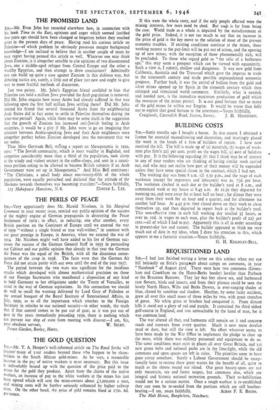REQUISITIONED LAND
SIR,—I had just finished writing a letter on this subject when my eye fell belatedly on Strix's paragmaph about camps on commons, in your " Notebook " of August 23rd. There were here two commons (Green- ham and Crooldiam on the Hants-Berks border) lovelier than Purbeck or the Braunton Burrows. They lay 600 feet above sea, and harboured rare flowers, birds and insects, and from their plateau could be seen the lovely North Hants, Wilts and Berks Downs, in ever-ranging shades ot blue, chased by sunshine and shadow. Heather, by some lucky accident, grew all over this small moor of three miles by two, with great stretches of gorse. No white grass or bracken had conquered it. From distant hills it stood out a glory of red and purple. It contained the third oldest golf-course in England, and was untouchable by the hand of man, for it was common land.
The war altered all that, and hutments still remain on it and concrete roads and runways from every quarter. Much is now mere derelict mud or dust, but still the view is left. No effort whatever seems to have been made by the War Office to implement the pledge to clear up the mess, while there was military personnel and equipment to do so. The same conditions must exist in places all over Great Britain, and y.t.t new green belts and national parks are in the lime-light, while the old commons and open spaces are left in ruins. The priorities seem to have gone astray somehow. Surely a Labour Government should be excep- tionally keen to restore these great wastes for the benefit of all, quite as much as the shores round our island. Our great beauty-spots are not only mountain, sea and forest scapes, but commons also, which are integral and historic national recreation grounds. Their re-habilitation would not be a serious matter. Once a rough asurface is re-established they can soon be re-seeded from the portions which are still heather-
bearing.—I am, yours faithfully, ALBAN F. E. BACON. The Malt House, Burghclere, Newbury.


























 Previous page
Previous page